|
|
|
Sort Order |
|
|
|
Items / Page
|
|
|
|
|
|
|
| Srl | Item |
| 1 |
ID:
131507


|
|
|
|
|
| Publication |
2014.
|
| Summary/Abstract |
Two parallel norms mandate an international duty to hold state leaders individually accountable for serious corruption and human rights crimes. The development of these new norms is poorly explained by realist and neoliberal perspectives, but there are also weaknesses in recent constructivist explanations of norm diffusion that emphasize agency at the expense of structure. Such approaches have difficulty explaining the source of and similarities between new norms, and treat norm entrepreneurs as prior to and separate from their environment. In contrast, drawing on sociological institutionalism, we present a more structural explanation of individual accountability norms. The norms derive from an overarching modernist world culture privileging individual rights and responsibilities, as well as rational-legal authority. This culture is more generative of norm entrepreneurs than generated by them. The specific norms are instantiated through a process of "theorization" within permissive post-Cold War conditions, and diffused via mimicry, professionalization, and coercive isomorphism
|
|
|
|
|
|
|
|
|
|
|
|
|
|
|
|
| 2 |
ID:
105849
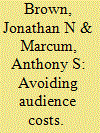

|
|
|
| 3 |
ID:
130944
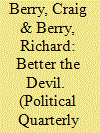

|
|
|
|
|
| Publication |
2014.
|
| Summary/Abstract |
Gus O'Donnell's vision of 'better government' is presented as a critique of party politics, most specifically the short-termism, selfishness and incompetence of elected politicians. There are few people better placed than O'Donnell to form such judgements. However, O'Donnell goes much further, by calling into question the legitimacy of the democratic system which gives rise to party politics. His article outlines several mechanisms by which the exercise of power by elected ministers could be constrained by a managerialist accountability framework, without addressing the question of who determines the appropriate framework for ministerial performance. The House of Commons is condemned as 'too politicised'. O'Donnell also offers substantial praise for apparently 'depoliticised' policy-making processes, overlooking the inherently political constitution of such processes. In doing so, O'Donnell claims to be challenging party politics on behalf of voters/taxpayers, but instead seeks to dismantle any possibility of the public expressing a collective will via the ballot box that might challenge the immutability of the market economy.
|
|
|
|
|
|
|
|
|
|
|
|
|
|
|
|
| 4 |
ID:
129652
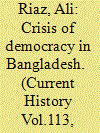

|
|
|
|
|
| Publication |
2014.
|
| Summary/Abstract |
Since its independence in 1971, Bangladesh has experienced tumultuous times. The country endured prolonged military rule from 1975 to 1990, but democratic aspirations have defined the course of its politics. In the past four decades, Bangladesh has experimented with various systems of governance, including one party presidential rule and, currently, a multiparty parliamentary system, having returned to parliamentary democracy in 1991. Bangladesh has demonstrated favorable elements of democracy, such as high levels of political participation, a plethora of political parties, a growing middle class, a vibrant civil society, and periodic elections. Yet the nation has undergone repeated reversals of democratic gains, thanks to civilian authoritarianism and military dictatorship. The polity has suffered from an absence
of strong institutions to ensure the rule of law, accountability, and transparency in governance.
|
|
|
|
|
|
|
|
|
|
|
|
|
|
|
|
| 5 |
ID:
101509
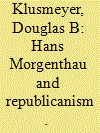

|
|
|
|
|
| Publication |
2010.
|
| Summary/Abstract |
Recent scholarship has called attention to the republican dimension of Hans Morgenthau's approach to politics in the postwar era, but the role republicanism played in his thought remains ambiguous. This essay examines that role, and explores its tensions with other aspects of his understanding of politics. It argues that he expanded and deepened his approach to politics as he developed a republican critique of American domestic politics. However, his conception of international politics remained rooted in the reason-of-state tradition, and evinces little evidence of his increasing engagement with republicanism. In this selective use of republicanism, he left its tensions with other aspects of his thinking unresolved, but this usage also suggests his recognition of the inadequacy of the original formulation of his realist approach. In considering what IR theorists today may learn from republicanism, his example is highly instructive in any effort to reconstruct the foundations of realism.
|
|
|
|
|
|
|
|
|
|
|
|
|
|
|
|
| 6 |
ID:
171042
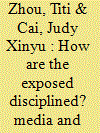

|
|
|
|
|
| Summary/Abstract |
Authoritarian governments are believed to tolerate media exposure of malfeasant agents to hold them accountable. This line of argument is based on the strong assumption that erring agents will be duly disciplined once their malfeasance is known to their superiors. This study tests this assumption by examining how the Chinese government responds to exposed agents. It finds that media exposure conditionally contributes to the discipline of agents. Exposed agents may be punished when their malfeasance gains high publicity, especially when the malfeasance falls under the high-priority concerns of the government. Hence, while media exposure constitutes a form of third-party monitoring, the discipline of exposed agents is conditional.
|
|
|
|
|
|
|
|
|
|
|
|
|
|
|
|
| 7 |
ID:
095079
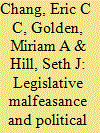

|
|
|
|
|
| Publication |
2010.
|
| Summary/Abstract |
Utilizing a unique data set from the Italian Ministry of Justice reporting the transmission to the Chamber of Deputies of more than the thousand requests for the removal of parliamentary immunity from deputies suspected of criminal wrongdoing, the authors analyze the political careers of members of the Chamber during the first eleven postwar legislatures (1948-94). They find that judicial investigation typically did not discourage deputies from standing for reelection in Italy's large multimember electoral districts. They also show that voters did not punish allegedly malfeasant legislators with loss of office until the last (Eleventh) legislature in the sample. To account for the dramatic change in voter behavior that occurred in the early 1990s, the investigation focuses on the roles of the judiciary and the press. The results are consistent with a theory that a vigilant and free press is a necessary condition for political accountability in democratic settings. An independent judiciary alone is ineffective in ensuring electoral accountability if the public is not informed of political malfeasance.
|
|
|
|
|
|
|
|
|
|
|
|
|
|
|
|
| 8 |
ID:
102687
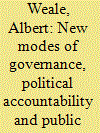

|
|
|
| 9 |
ID:
178070
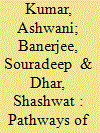

|
|
|
|
|
| Summary/Abstract |
A paucity of understanding of the pathways through which money flows during elections renders all discussion on campaign finance conjectural and unpersuasive. Drawing on qualitative evidence from two assembly constituencies in Gujarat, the paper seeks to understand the “opaque” and “enigmatic” ways in which parties and candidates mobilize campaign finance and the mechanisms through which money and other goodies get channeled into the electoral process. Further, the paper also attempts to compute realistic estimates of campaign expenses under critical campaign heads and highlights the ways in which candidates bypass official spending limits set by the Election Commission. The paper’s findings speak to some of the core themes in the burgeoning scholarship on electoral integrity and political economy of campaign finance in the world’s emerging democracies.
|
|
|
|
|
|
|
|
|
|
|
|
|
|
|
|
| 10 |
ID:
192038
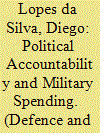

|
|
|
|
|
| Summary/Abstract |
Over the past two decades, evidence on the relationship between democratization and reductions in military spending has accumulated. This association has proven to be robust to a wide variety of specifications and samples. Nevertheless, there remain two important gaps in our understanding of this relationship. Firstly, while most studies argue that democratic political institutions constrain the incumbents’ power to allocate resources to the military, there is still disagreement about which institution. Second, empirical evidence on causality is very scarce. Endogeneity remains a difficult problem to grapple with. To address these issues, I specify a clear set of channels of interaction linking democratic political institutions to military spending. Following previous work, I also argue that political accountability constrains allocations to the military. However, I distinguish three types of accountability: horizontal, vertical and diagonal. I find that diagonal accountability is the strongest mechanism. Furthermore, I use a country’s accumulated experience with political accountability as an instrumental variable to tackle the endogeneity between political accountability and military spending. I find evidence suggesting that political accountability causes military spending as a share of GDP to fall.
|
|
|
|
|
|
|
|
|
|
|
|
|
|
|
|
| 11 |
ID:
174564
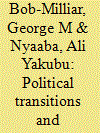

|
|
|
|
|
| Summary/Abstract |
What role does a commission of inquiry (COI) play in delivering accountability? In theory, when the public delegates power to political leaders to formulate and implement policies, they seek political accountability in return. Using Ghana as a case study, this study examines how the operations of COIs may deliver accountability. Principal–agent theories of accountability and African conceptions of legitimacy are incomplete on their own and need to be integrated into an explanation of political accountability that takes into consideration political transitions and the role of COIs in delivering a minimalist form of accountability. This study argues that a COI is an instrument of regime legitimatisation. The demands by citizens for political accountability in Ghana correlate with political transitions. Accompanying each power alternation was a different model of political accountability. To understand the predominant applications of accountability, we emphasise the politicisation of accountability.
|
|
|
|
|
|
|
|
|
|
|
|
|
|
|
|
| 12 |
ID:
133022
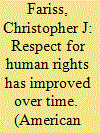

|
|
|
|
|
| Publication |
2014.
|
| Summary/Abstract |
According to indicators of political repression currently used by scholars, human rights practices have not improved over the past 35 years, despite the spread of human rights norms, better monitoring, and the increasing prevalence of electoral democracy. I argue that this empirical pattern is not an indication of stagnating human rights practices. Instead, it reflects a systematic change in the way monitors, like Amnesty International and the U.S. State Department, encounter and interpret information about abuses. The standard of accountability used to assess state behaviors becomes more stringent as monitors look harder for abuse, look in more places for abuse, and classify more acts as abuse. In this article, I present a new, theoretically informed measurement model, which generates unbiased estimates of repression using existing data. I then show that respect for human rights has improved over time and that the relationship between human rights respect and ratification of the UN Convention Against Torture is positive, which contradicts findings from existing research.
|
|
|
|
|
|
|
|
|
|
|
|
|
|
|
|
| 13 |
ID:
130584
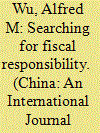

|
|
|
|
|
| Publication |
2014.
|
| Summary/Abstract |
The 2008-2009 global financial crisis has made budget management and fiscal responsibility more imperative in many developed economies. A budget crisis has not occurred in emerging economies such as China. However, in China, the demands of fiscal responsibility have increased against the backdrop of bulging government revenues in recent years. Over the past decade, the Chinese government has started to promote self-constrained bureaucracy and strengthen its fiscal responsibility and accountability in budget formulation and implementation. The 1999 budget reform that aimed to improve fiscal responsibility was hailed a success by previous literature. Drawing on field research in five counties in China between 2008 and 2010, it is argued that though some achievements have been made, the budget reform has not substantially improved both accountability and transparency within the bureaucracy. The implication of this study is that top-down, supply-side reforms led by the state may not be effective.
|
|
|
|
|
|
|
|
|
|
|
|
|
|
|
|
|
|
|
|
|